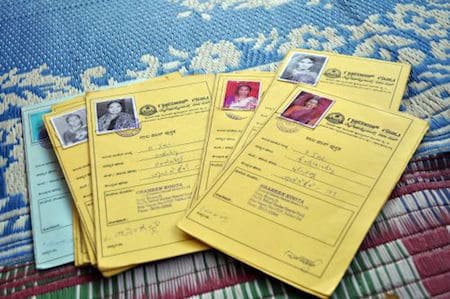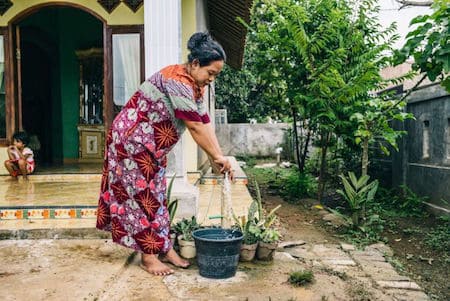How Water.org ‘Took a Leap of Faith’ into Social Impact Investing
Consumer demand is a force that changes the world. With each purchase, we shape and sometimes even revolutionize the world we live in. A great example of this is the smart phone. The iPhone has changed consumer behavior and unleashed possibilities unimaginable to us 15 years ago. As consumers, we use our dollars as a proxy for our voice, affirming products and brands that best align with our needs and values, propelling them to scale and expand. What if we could tap into this intrinsic power of the consumer to end one of the greatest challenges facing the world today – the global water crisis? What if those in need of safe water and sanitation were empowered to purchase their own solutions?
Research and experience has shown that there is a $12 billion demand among families at the base of the economic pyramid (BoP) for access to affordable financing, such as small loans, to meet their water and sanitation needs. This represents at least 565 million people at the BoP who want to be consumers, but are waiting for the market to reach them. How do we meet this immense demand? Recognizing that charity can only do so much, how do we unlock the investment capital needed to match the scale of the global water crisis, and help create an ecosystem that will empower the BoP to participate as customers?

WaterCredit loan cards
At Water.org, an international non-profit dedicated to ending the global water crisis in our lifetime, we have been wrestling with these questions for decades – driving financial innovation in the sector and leveraging market forces. Taking a first step toward addressing this $12 billion demand, Water.org launched WaterCredit in 2003 – a market-based model that brings microfinance to the world’s poor to help them meet their water and sanitation needs. Through WaterCredit, Water.org has partnered with 65 local microfinance institutions (MFIs) across nine countries, providing $17 million in smart subsidies to help them develop WaterCredit loan portfolios. These primarily include small, affordable loans for BoP families to pay for the construction of a water connection and/or toilet within their home.
As such, we asked another important series of questions: What if we could tap into the immense wealth that sits in investment portfolios around the world and channel it to solve this massive challenge? Building on our expertise, what if we could build the market between social impact investors and WSS enterprises – including MFIs – that have the potential to reach hundreds of millions of people? What if we could demonstrate to forward-thinking philanthropists and investors, along with mainstream financiers, that there is a market demand – a pipeline of investable and bankable deals in the water sector? By tapping into global capital markets and harnessing the momentum around social impact investing, we have an opportunity to build on Water.org’s track record with WaterCredit, scale this proven model, and create a more financially inclusive ecosystem around water and sanitation.
This encouraged us to take a leap of faith and expand into the social impact investing arena – launching our first investment fund dedicated to BoP water and sanitation needs in 2015, which is currently investing in seven MFIs in India. Shortly after, Water.org launched its social impact investing manager – WaterEquity – to oversee this fund, build a highly experienced and fully dedicated team, and launch additional funds.

A WaterCredit loan recipient in Indonesia.
WaterEquity will raise and deploy social investment capital to high-growth and purpose-driven enterprises – including MFIs – across the water and sanitation supply chain that have strong potential to scale their impact at the BoP. Through these funds, WaterEquity will provide an on-ramp for social impact investors to invest and optimize their contributions in this sector to ensure tangible and long-term impact.
To unleash this approach, WaterEquity is launching a $50 million fund (the WaterCredit Investment Fund 3 – WCIF3) in the first quarter of 2017, targeting enterprises in India, Indonesia, Cambodia and the Philippines. This seven-year fund will reach at least 4.6 million people at the BoP, while offering a pre-tax financial return of 3 percent. The fund’s investment strategy will be designed to mitigate risk and maximize impact by spreading assets over multiple geographies, business models and market segments. And while the lion’s share of investments will go to MFIs, this fund will also invest in key local water and sanitation businesses, including: water purification and sales kiosks, small water utilities, and sanitation facility construction companies providing key products to municipal governments, as well as schools and hospitals. And this is just the beginning.
Our hope is that as more investors see these efforts unfolding, they will be inspired to come on this journey with us. As WaterEquity launches its WCIF3 in South and Southeast Asia, it is already building the foundation for future investments in Africa – another region where WaterCredit is now expanding rapidly. Moreover, for the families and communities who continue to be deprived of this basic necessity, and the girls and women who waste millions of hours a day scavenging for water; we hope this unleashes a new wave of opportunity and a chance to participate as consumers. The ability to exercise their voice; the chance to live a better life.
As Poppy, a mother in Bangladesh who took out a WaterCredit loan to purchase a water pump, would say: “I am happy that my children will not know the water crisis like I did before.”
Top photo: An Indian woman shows her loan card. All images courtesy of Water.org.
Alix Lebec is the Director of Business Development & Investor Relations at WaterEquity.
Hannah Kovich is Investor Relations Manager at WaterEquity.
- Categories
- Environment, Impact Assessment, Investing, Social Enterprise



